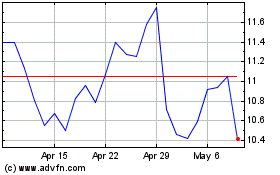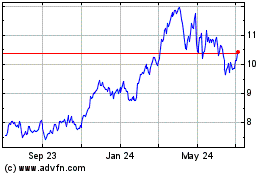3rd UPDATE: La Caixa Plans To Spinoff Bank Operations To Criteria
January 27 2011 - 2:50PM
Dow Jones News
Spanish savings bank La Caixa Thursday said it plans to transfer
its banking business to listed unit Criteria CaixaCorp SA (CRI.MC)
in a bold restructuring effort to improve management and its access
to capital markets.
The move by Barcelona-based La Caixa, the biggest and healthiest
of the large savings banks, could set an example for other "cajas"
to follow, analysts say. In the wake of the international financial
crisis, Spain's government and central bank are pressuring the
mutually owned cajas to spin off their banking operations into
incorporated companies that can trade on the stock market to
improve accountability and funding options.
In a regulatory filing, La Caixa said it will transfer its
banking business to Criteria, whose name will be change to
CaixaBank. CaixaBank will give La Caixa a controlling stake as well
as some of its biggest industrial shareholdings, like its stakes in
Gas Natural SDG SA (GAS.MC) and Abertis SA (ABE.MC). After
CaixaBank issues EUR1.5 billion worth of convertible shares to
shore up its capital base, it will have a core Tier-1 capital ratio
of 10.9% and La Caixa will have an 81% stake in CaixaBank.
CaixaBank will be Spain's third largest listed bank just behind
local giants Banco Santander SA (STD) and Banco Bilbao Vizcaya
Argentaria SA (BBVA). La Caixa will maintain the social services
traditionally provided by Spanish savings banks and will finance
them with its industrial stakeholdings.
Unprecedented economic turmoil and a rising pile of bad loans
linked to the implosion of the country's once mighty real estate
sector is forcing the cajas to seek fresh alternatives to raise
capital, and also pursue market discipline to improve transparency
and foster efficiency.
On Monday, the government raised capital requirements for all
financial institutions and said it would require some cajas to have
even higher levels. The move aims to accelerate the transformation
of cajas into listed banks.
The government also overhauled regulations to allow the partial
nationalization of ailing cajas and enable the injection of fresh
capital into them.
The clean-up of banks is a key part of Spain's effort to shore
up investor confidence in the euro zone's fourth-largest economy.
Spain's borrowing costs sky-rocketed after Ireland's finances
buckled under the weight of massive loan losses among its banks.
Ireland is also suffering from a massive housing bust.
With close ties to local communities and often controlled by
local governments, Spain's cajas have borne the brunt of the
collapse of Spain's decade-long housing boom. Their fast-rising bad
debt levels, combined with a lack of transparency, have stoked
investor concerns and created severe financing difficulties for
both the cajas and the country's listed banks.
Last year, the Barcelona-based giant approached listed Catalan
rival Banco Sabadell SA (SAB.MC) to discuss a potential merger that
would have given La Caixa a market listing and become a full bank,
according to people familiar with the situation.
The talks between the two companies didn't lead to formal
negotiations, as the overlap and geographical concentration of the
two banks in their home Catalan markets across northeastern Spain
would have resulted in massive layoffs and risk concentration at a
time of challenging market conditions, these people added.
-By Santiago Perez, Dow Jones Newswires; (34) 91 395 8120;
djmadrid@dowjones.com
-Jonathan House contributed to this article.
BBVA Bilbao Vizcaya Arge... (NYSE:BBVA)
Historical Stock Chart
From Jun 2024 to Jul 2024

BBVA Bilbao Vizcaya Arge... (NYSE:BBVA)
Historical Stock Chart
From Jul 2023 to Jul 2024
